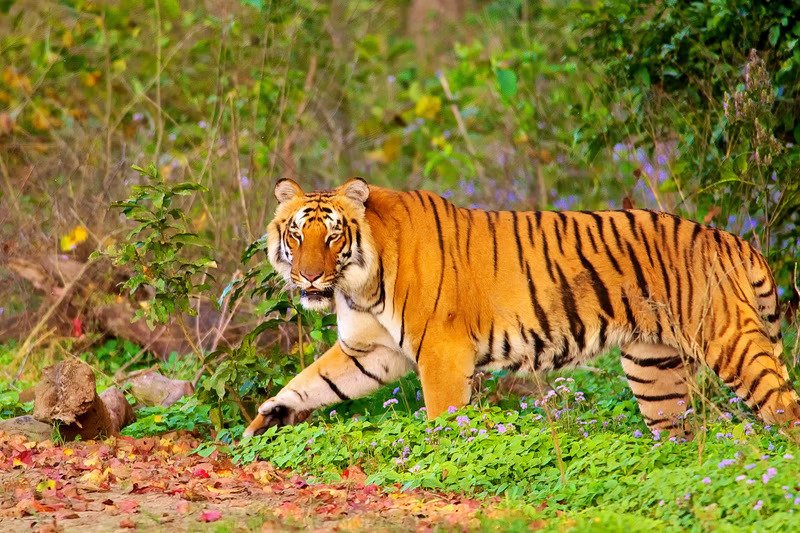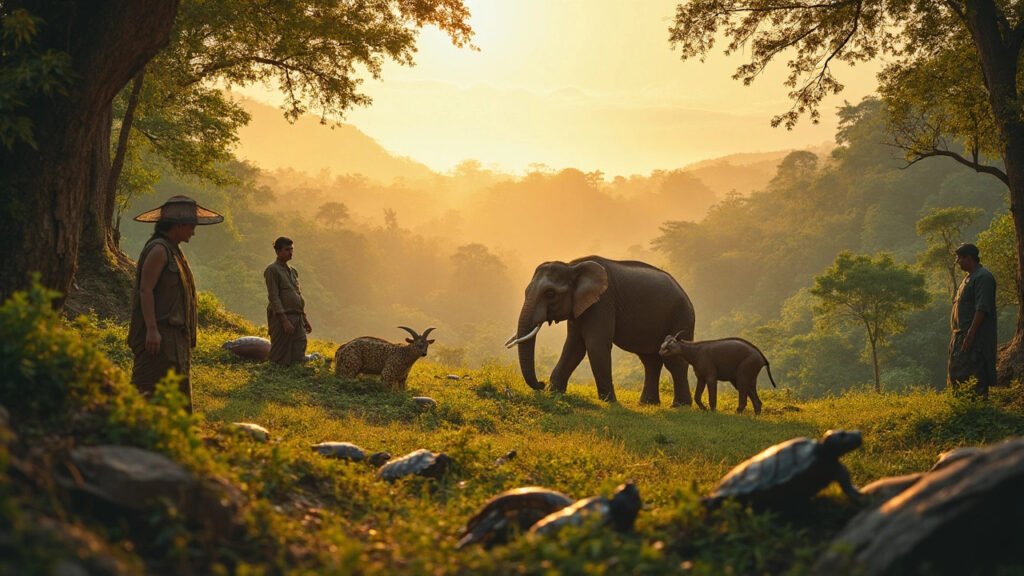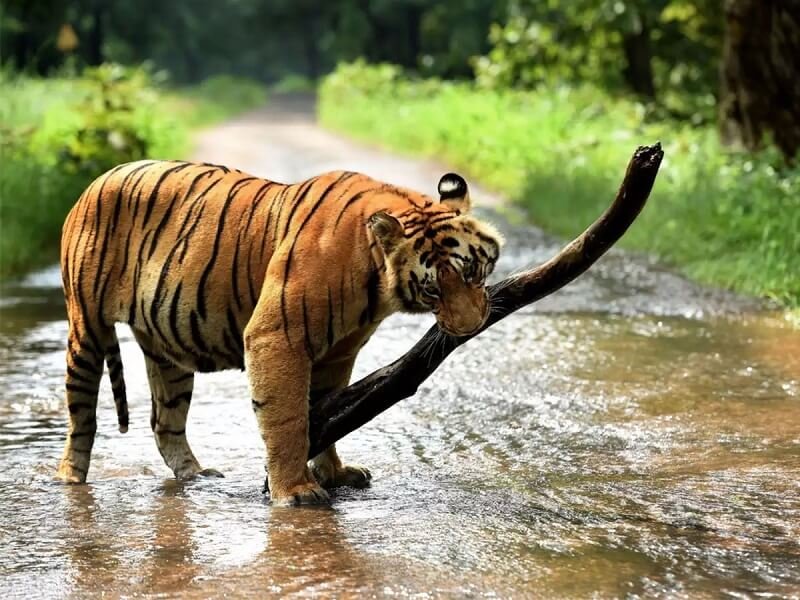Hidden in the Western Ghats of Tamil Nadu, Megamalai (also “High Wavy Mountains”) is far more than a cool climate hill station surrounded by tea estates. It is a rich tapestry of wildlife, ecosystems, endemic species, and a growing conservation narrative. Under Rengha Holidays, led by Mr. Ravichandran, wildlife tourism here isn’t just about watching animals—it’s about protecting them, respecting the land, and building sustainable connections between people and nature.

Srivilliputhur-Megamalai Tiger Reserve: The Big Picture
- In February 2021, the government officially notified the Srivilliputhur-Megamalai Tiger Reserve. This brings together Megamalai Wildlife Sanctuary and the Srivilliputhur Grizzled Squirrel Wildlife Sanctuary, creating a large protected landscape of ~1,016.57 sq km, with core and buffer zones.
This large area serves as a vital wildlife corridor, connecting to Kerala’s Periyar Tiger Reserve and other key Western Ghat protected areas, which helps with genetic flow and habitat continuity.
Flora & Habitat Diversity
- Megamalai Wildlife Sanctuary spans about 63,000 hectares. It includes diverse habitat types: evergreen forests, semi-evergreen, moist mixed deciduous, shrub forests, riparian zones, etc.
- A study of woody plant diversity (2012-2015) documented 486 woody plant species—these include trees, shrubs, lianas—from 76 families and 237 genera, with dominant families being Rubiaceae, Fabaceae, Lauraceae, Euphorbiaceae, Moraceae, Malvaceae. Of the 486 woody taxa, 8 species are confined only to this sanctuary—meaning endemics unique or highly restricted there.

Conservation, Challenges & Opportunities
- The creation of the Srivilliputhur-Megamalai Tiger Reserve has created stronger legal protection and better focus on conservation across a larger contiguous habitat.
- Human-wildlife conflict, forest encroachment, habitat fragmentation, roads, poaching, and grazing are continuing pressures. Ensuring wildlife corridors, buffer zones, and enforcing protections are critical.
- There is great potential for scientific research (endemic species, bird surveys, plants), eco-tourism, guided treks, nature education. These can benefit local communities, provide livelihoods, and strengthen conservation incentives when done well.
Megamalai Wildlife Tourism: The Rengha Holidays Way
Under Mr. Ravichandran’s leadership, Rengha Holidays has positioned itself not just as an agency that shows wildlife, but as one that cares for how wildlife is shown, and how the natural world is preserved. Some key elements:
- Sustainable Practices: Homestays partnered with Rengha are encouraged to follow eco-friendly measures—waste reduction, local sourcing of food, limiting plastic, maintaining a low-impact footprint.
- Quality & Safety: Ensuring guests get authentic wildlife experiences (bird walks, guided forest treks, safaris) but safely, with trained local guides, respect for wildlife rules, and good equipment.
- Supporting Local Communities: By involving plantation workers, locals, and families in guiding, hospitality, food preparation, Rengha helps channel tourism revenue to people who live in or near the forest, so conservation and care for wildlife become community interests.
- Education & Interpretation: Not just spotting animals, but learning about their ecology, their threats, and how travelers can minimize their environmental impact. Rengha’s packages often include nature-interpretation sessions, bird walks, talks.

Best Times & Tips for Wildlife Viewing
- Best seasons: Cooler, post-monsoon seasons (October to March) are more favorable for wildlife spotting, forest trails, and comfortable weather. Avoiding the hot dry months (March-May) is better.
- Time of day: Early morning (sunrise to mid-morning) and late afternoon / dusk are prime for animal activity. Bird watchers will especially want to be out early.
- Equipment: Good binoculars, camera with zoom, hiking shoes, rain gear (if monsoon or early rains), insect repellent, sturdy clothing.
- Guidelines: Always follow forest department rules; maintain silence; avoid flash photography; do not disturb nesting or resting animals; use local guides; stay on marked trails or approved safari roads.
Why Megamalai Wildlife Experience Matters
- Endemism: The presence of species found nowhere else (plants and possibly animals) makes this area irreplaceable for biodiversity conservation.
- Corridor Function: Connecting habitats helps large mammals (like tigers, elephants) to have enough space for movement, thereby reducing inbreeding and stress.
- Ecosystem Services: Forests here are vital for watershed protection (Vaigai river catchment, etc.), climate regulation, carbon storage, and sustaining local agriculture.
- Tourism with a Conscience: As more people look for meaningful, responsible travel, Megamalai offers a model of wildlife tourism that can nurture environmental awareness while providing livelihoods.
Bringing It All Together: Mission & Vision
Under the leadership of Mr. Ravichandran, Rengha Holidays has always prioritized quality service, sustainability, and customer satisfaction. Our mission is to continue making Theni and Megamalai top destinations for nature lovers and adventure seekers while promoting eco-friendly practices. Today, Rengha Holidays stands as a beacon of trust and quality in South India’s travel industry, embodying a legacy of excellence and dedication. Pioneering tourism in Megamalai, Rengha Holidays was the first to introduce travelers to its lush tea estates, pristine landscapes, and diverse ecosystems. We crafted unique packages and sustainable travel experiences, bringing out the best of this hidden gem while preserving its natural beauty. Rengha Holidays’ commitment to eco-friendly tourism has played a key role in supporting the local economy and conserving the environment.
Through wildlife-based tourism, Rengha Holidays doesn’t just allow people to observe Megamalai’s wild inhabitants—it helps maintain the very habitats those animals need. Every trip built, every homestay used, every local guide employed, contributes to a larger story of conservation.
MegamalaiWildlife #MegamalaiWildlifeSanctuary #MegamalaiTigerReserve #WildlifeSanctuary #TigerReserve #WildlifeLovers #NatureConservation #EcoTourism Megamalai #WesternGhats #TamilNaduTourism #TheniTourism #HiddenGemOfIndia #IncredibleIndiaWildlifePhotography #BirdWatching #NatureTrails #EcoFriendlyTravel #SustainableTourism #AdventureInNature #WildlifeSafariRenghaHolidays #TravelWithRengha #RenghaEcoTours #RenghaWildlifeTrips MegamalaiWildlife #MegamalaiWildlifeSanctuary #MegamalaiTigerReserve #WesternGhats #TamilNaduTourism #EcoTourism #WildlifePhotography #RenghaHolidays https://megamalai.in/https://www.instagram.com/reel/DSJY1HagbNs/?igsh=MTNlaDkyZ3I0eG1uMQ==https://wa.link/mlarsrhttps://renghaholidays.com/packages





